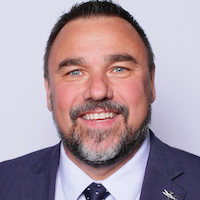
Hearst Launches Faubell Fellowship To Find Tech Talent

Broadcasters have spoken for years about the difficulty of finding fresh technology talent to work at their stations, particularly as the ongoing shift to IT-centric tools now requires a blend of software programming and networking skills with broadcast-specific skills like understanding RF systems or the dynamic needs of live news production.
Hearst Television, which owns and operates 33 television stations reaching over 22 million U.S. television households, has long been proactive in growing IT and engineering talent within its own walls. Over a decade ago the station group started a training program to teach IT basics to broadcast engineers. More recently, it developed a training program that teaches the fundamentals of on-air operations to new hires coming in with an IT background.
Now Hearst is going one better in addressing the broadcast tech talent gap by founding the Marty Faubell Broadcast Technology Fellowship, which aims to recruit fresh talent into the broadcast industry by placing eight to 10 young graduates or military veterans at Hearst stations across the country. The program is named after longtime Hearst engineering VP Martin Faubell, who retired in 2020 after leading the group through a number of technology milestones including the digital TV transition and shift to HD news production.
Hearst Television President Jordan Wertlieb noted that throughout his long career at Hearst, Faubell was very focused on developing new engineering talent.
“We are pleased and proud to honor him with the creation of this program, which was developed to help ensure a bright future for emerging generations of technology leaders in our company and the industry by applying the type of mentorship Marty provided so many for nearly four decades,” Wertlieb said.
Under the Faubell program, current college or technical school students, as well as recent graduates and veterans, can start applying this spring for slots at Hearst stations this fall.
Once accepted, the fellowship recipients will work at a Hearst station 40 hours a week for 10 weeks and be trained in all aspects of television production with an emphasis on engineering and IT. They will receive hands-on experience in broadcast operations, engineering and IT maintenance and support, electronic newsgathering, production and broadcast transmission, as well as meeting with station leadership and other business-side executives.
Hearst hasn’t picked any particular stations to host fellowship recipients, but instead will seek the best candidates on a nationwide basis and then train them at a Hearst outlet in their local market. If a candidate is successful in training and genuinely likes the work, then Hearst will place them in a permanent role at one of its stations anywhere in the country, said Stefan Hadl, who succeeded Faubell as Hearst’s engineering VP. He thinks the fellowship will help identify candidates with the right mindset for the TV business.

Stefan Hadl
“You either love this business or you hate it,” Hadl said. “If you don’t have that desire to be challenged and thinking on your feet every day, then this isn’t your business — because this business will challenge you day in and day out.”
Hadl said that talent shortages “come in waves” and vary widely, market by market. But overall, Hearst and other broadcasters are seeing a decline in applications for open positions as the television industry competes with digital giants like Google for the best young technology talent. And that waning interest among young engineers is happening even as stations are increasingly using the IT-based tools they learned about in school.
“We have to do a better job of selling us and getting out in front of them and explaining,” Hadl said. “The technologies we’re deploying and working on and trying to develop in our business are ever-changing and expanding. It’s a great opportunity to be on the front lines of figuring out what do with NextGen TV, what we do as we migrate more and more to this IT-centric world.”
While Hearst hasn’t disclosed funding details behind the fellowship, Hadl said the company has made a “substantial initial investment” and that his hope is to expand the program in the future. He said Wertlieb has long been adamant that when Hearst identifies good technology talent, “we’ve got to find them a home in our business.”
On a personal note, Hadl added that he is proud to oversee a program bearing Faubell’s name after working under him for over two decades. “Marty’s forethought and planning for everything — and everywhere we’ve headed as a company — has been unmatched in our industry.”
































Comments (0)